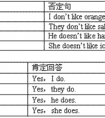(A) 根据下列句子及所给汉语注释,写出空缺处各单词的正确形式,每空只写一词。1. How long have your brothers been (士兵)? 2. Guangdong is in the (南方) part of Ch-九年级英语
why: That’s why I came round. 这就是我来的原因。(引导表语从句)
一些其它类型的副词,如表示方向的副词:
Let’s go inside. 咱们到里面去。
Take two steps forward. 向前走两步。
1、实义动词前,be动词、情态动词之后。
I am also Bush.
I can also do that.
I also want to play that games.
I get up early in the morning everyday. 我每天早早起床。
He gave me a gift yesterday. 他昨天给了我一件礼物。
She didn't drink water enough. 她喝的水不够。
The train goes fast. 火车跑得快。
We can go to this school freely. 我们可以免费到这家学校学习。
They left a life hardly then. 当时他们的生活很艰难。
He has a new hat on today. 他今天戴了一顶新帽子。
I have seen this film twice with my friends. 这部电影我和朋友看过两次。
2、副词修饰形容词,副词时,副词在前面,而被修饰的词在后面。
It's rather easy, I can do it. 这很容易,我能做到。
He did it quite well. 他做得相当好。
It's rather difficult to tell who is right.很难说谁是对的。
It's so important that I must tell my friends. 这件事太重要了,我得告诉我的朋友。
It's much better. 好多了。
3、频度副词可放在实义动词的前面,情态动词和助动词的后面。
I often help him these days. 这些日子我经常帮助他。
I always remember the day when I first came to this school.
我常常记得我第一次来学校的那一天。
You mustn't always help me. 你不能老是帮助我。
He seldom comes to see us. 他很少来看我们。
We usually go shopping once a week. 我们通常一周买一次东西。
The new students don't always go to dance. 新学生并不时常去跳舞。
4、疑问副词,连接副词,关系副词以及修饰整个句子的副词,通常放在句子或从句的前面。
When do you study everyday? 你每天什么时间学习?
Can you tell me how you did it? 你能告诉我你如何做的吗?
First, let me ask you some questions. 先让我来问几个问题。
How much does this bike cost? 这辆车子多少钱?
Either you go or he comes. 不是你去就是他来。
The students were reading when the teacher came into the classroom. 当老师进教室时,学生们正在读书。
5、时间副词和地点副词在一个句中, 地点副词在前面时间副词在后面。
We went shopping in the supermarket at 9 o'clock yesterday.
昨天九点钟我们到超市买东西了.
What were you doing in the classroom yesterday afternoon?
昨天下午你在教室里干什么?
The accident took place in the Eleven Avenue one hour ago.
一小时前十一号大街发生了一场事故。
6、否定副词在句首,句子要倒装,如:
Never have I felt so excited!
1) close与closely
close意思是"近"; closely 意思是"仔细地"
He is sitting close to me.
Watch him closely.
2) late 与lately
late意思是"晚"; lately 意思是"最近"
You have come too late.
What have you been doing lately?
3) deep与deeply
deep意思是"深",表示空间深度;deeply时常表示感情上的深度,"深深地"
He pushed the stick deep into the mud.
Even father was deeply moved by the film.
4) high与highly
high表示空间高度;highly表示程度,相当于much
The plane was flying high.
I think highly of your opinion.
5) wide与widely
wide表示空间宽度;widely意思是"广泛地","在许多地方"
He opened the door wide.
English is widely used in the world.
6) free与freely
free的意思是"免费";freely 的意思是"无限制地"
You can eat free in my restaurant whenever you like.
You may speak freely; say what you like.
副词有加a或ly的 区别在于通常加a 的副词描述一种状态,而加ly 的副词则倾向于感觉。
考点名称:实义动词的单数第三人称形式
在一般现在时的肯定句中,当主语为非第三人称单数时,谓语动词用原形;
当主语为第三人称单数时,谓语动词用单数第三人称形式。- 实义动词的一般现在时的单数第三人称形式遵从“s,es, ies”六字母规则。如下表所示:
实意动词单数第三人称变化规律:规则 动词原形 第三人称
单数形式s 一般在词尾加s(读音规则:
清清浊浊元浊,
在清辅音后读清辅音/s/,
在浊辅音和元音后读/z/)stop
take
clean
play
growstops/s/
takes/s/
cleans/z/
plays/z/
grows/z/es 以,x,ch,sh,或o结尾的动词
加-es(读/iz/)pass
fix
wash
watch
dopasses
fixes
washes
watches
doesies 以辅音字母
加y结尾的动词,变y为ies(读/iz/)fly
carry
hurryflies
carries
hurries
注意:不规则变化的有have—has, be—is, go—goes, do—does 一般现在时,当主语是第三人称单数时,谓语动词要用第三人称单数形式
主语是第三人称单数有以下几种情况:(1) 不可数名词做主语:
Some water is in the glass(2) 单个的可数名词做主语:
The girl is Chinese. My watch is on the dresser.
(3) He ,she , it 等代词单个做主语:
He is in the tree. She likes her family very much.
(4) 单个的人名,地名或称呼作主语:
Mary is a doctor. Uncle Li speaks a little English.
Changchun is a beautiful city.(5) 指示代词this, that 等作主语:
This is a pear. That is an apple .(6) Everyone, everything ,something, nobody, nothing.等不定代词作主语时
Is everyone here today? Everything is ok .(7)单个数字作主语时:
”8” is a good number in China.
动词单数第三人称形式的一般现在时的句子的否定句、疑问句及特殊疑问句。 <?xml:namespace prefix = "o" ns = "urn:schemas-microsoft-com:office:office" />否定句:
在主语的后面实义动词前加doesn’t(注意实义动词应恢复原形。)主语(单三)+doesn’ + 动词原形+其他
Jim likes football变否定: Jim doesn’t like football
He has lunch at school. 变否定:He doesn’t have lunch at school.
- 最新内容
- 相关内容
- 网友推荐
- 图文推荐
| [家长教育] 孩子为什么会和父母感情疏离? (2019-07-14) |
| [教师分享] 给远方姐姐的一封信 (2018-11-07) |
| [教师分享] 伸缩门 (2018-11-07) |
| [教师分享] 回家乡 (2018-11-07) |
| [教师分享] 是风味也是人间 (2018-11-07) |
| [教师分享] 一句格言的启示 (2018-11-07) |
| [教师分享] 无规矩不成方圆 (2018-11-07) |
| [教师分享] 第十届全国教育名家论坛有感(二) (2018-11-07) |
| [教师分享] 贪玩的小狗 (2018-11-07) |
| [教师分享] 未命名文章 (2018-11-07) |

![Which of the following can you probably see in the meeting room? [ ]A. B. C.D. -七年级英语](http://www.00-edu.com/d/file/ks/4/2/dongmingci/2020-01-08/small97361980a56115e1c9237567439904fe1578422951.jpg)

![—Can the boy finish_____ the book in about a week? —I think he can. [ ]A. read B. reading C. to read D. reads -八年级英语](http://www.00-edu.com/d/file/ks/4/2/dongmingci/2020-01-08/smallfa4d713075e249356362fe7392193a301578421751.png)


